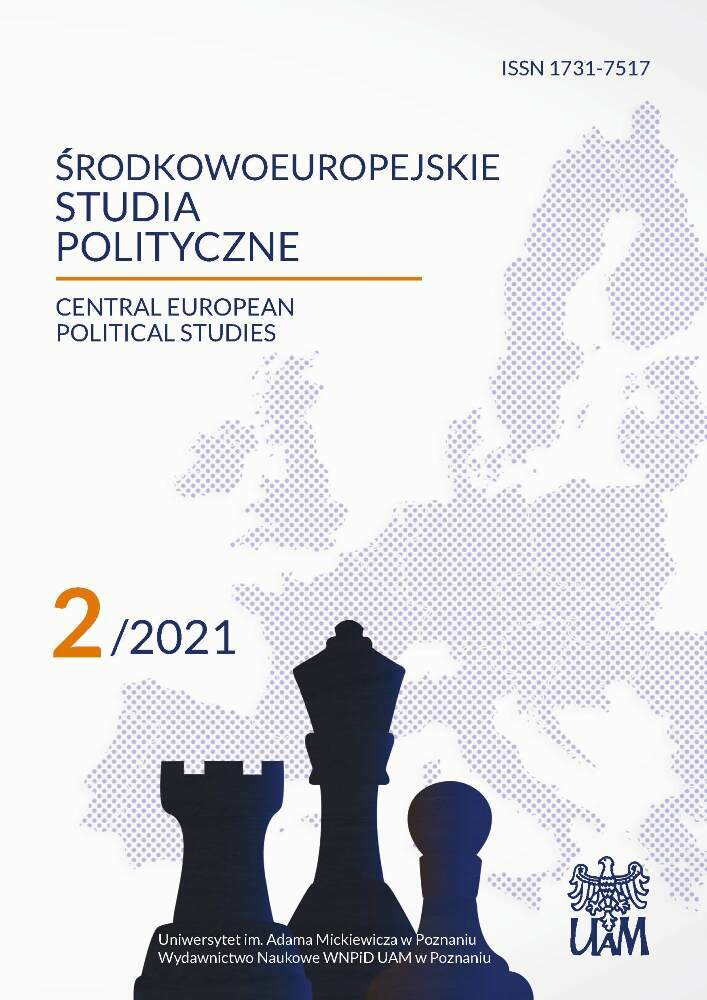Abstrakt
Artykuł prezentuje analizę znaczącej transformacji wartości wolności, równości i demokracji w zależności od kontekstu politycznego, historycznego i społeczno-kulturowego. Autorka rekonstruuje różnice interpretacji „uniwersalnych” wartości społeczno-politycznych przez klasycznych teoretyków liberalizmu – B. Constanta i A. de Tocqueville’a – w kontekście nowoczesnych międzynarodowych procesów politycznych. Do badania wykorzystuje metody analizy porównawczej i historycznej, a także kulturowe i aksjologiczne podejście do badania sfery ideologicznej i politycznej. W efekcie pokazuje, że starożytne rozumienie wolności nie miało znaczenia dla społeczeństwa XIX wieku. Podobnie jest w przypadku wciąż żywotnej klasycznej interpretacji wolności B. Constanta, która jednak nie jest już adekwatna do potrzeb społeczno-politycznych osób żyjących w XXI wieku. Dzieje się tak, ponieważ całkowicie nie uwzględnia ona nowej sfery ludzkiej działalności – wolności i prywatności w cyfrowym świecie. Uznając wartość demokracji, autorka zwraca uwagę, że dziś bardziej adekwatne do zrozumienia procesów politycznych jest podejście A. de Tocqueville’a. Na przykład powyborcza wojna informacyjna w Stanach Zjednoczonych w 2020 roku pokazuje znaczenie specyficznego rozumienia demokracji Tocqueville’a jako głębokiego procesu całkowitego rozprzestrzeniania się równości. Stwierdza się, że wartości polityczne znane współczesnemu dyskursowi często są interpretowane nieadekwatnie do rzeczywistości, ponieważ zrozumienie naukowe jest relatywnie stałe i z tego powodu niedotrzymujące tempa szybkiemu rozwojowi technologii informacyjnych, globalizacji i wirtualizacji.
Bibliografia
Ankersmit F. R. (2014), Aesthetic politics: political philosophy beyond fact and value, Publishing House of Higher School of Economics, Moscow.
Baeva L. V. (2013), Existential risks of the information age, “Information Society”, vol. 3.
Batalov E. Ya. (2010), The problem of democracy in American Political Thought of the XX century, Progress-Tradition, Moscow.
Benoit J.-L. (2004), Understanding Tocqueville, Armand Colin, Paris.
Boudon R. (2005), Tocqueville today, Odile Jacob, Paris.
Callot E.-F. (1987), Liberal Thought in the nineteenth century through three moments of its formation: Benjamin Constant, Alexis de Tocqueville, Lucien A. Prévost-Paradol, Lyon.
Canfora L. (2006), Democracy: history of an ideology, Seuil, Paris.
Concepts and Definitions of Democracy: Anthology (2006), KomKniga, Moscow, URSS.
Constant B. (1993), On the liberty of the ancients in its comparison with the liberty of modern people, “Polis (Political Studies)”, vol. 2.
Constant B. (2000), Principles of politics suitable for all government, Classical French liberalism, Moscow.
Coutant A. (2008), Tocqueville and the democratic constitution, Mare et Martin, Paris.
Drescher S. (1968), Dilemmas of Democracy: Tocqueville and Modernization, University of Pittsburgh Press, Pittsburgh, PA.
Frolov E. D. (2011), Benjamin Constant and the Birth of the modern concept of the Ancient civil society, “Vestnik Sankt-Peterburgskogouniversiteta. Series 2”, vol. 3.
Gutorov V. A., Shirinyants A. A. (2020), Liberal tradition and modern anti-liberalism, “Bulletin of the YankaKupala Grodno State University. Series 1. History and Archeology. Philosophy. Political Science”, vol. 12 (3).
Harrison L. E. (2008), The Central Liberal Truth: how politics can change culture and save it, New Publishing House: Liberal Mission Foundation, Moscow.
Karimov A. V. (2012), Fundamental concepts of social freedom of the XIX century, “Socio-economic phenomena and processes”, vol. 9.
Krasheninnikova Yu. A. (2003), Lessons of classical French liberalism for modern liberal theory, “The Political Science”, vol. 4.
Krasin Yu. A. (2012), On his deathbed or at the origins of reincarnation? What is happening with democracy, “Bulletin of the RSUH. Series: Political Science. History. International relations”, vol. 19 (99).
Laboulaye E. (1905), Political ideas of Benjamin Constant, Russian Thought, Moscow.
Leroux R., Hart D. M. (2014), The golden age of French liberalism, Ellipses, Paris.
Manent P. (1993), Tocqueville and the nature of democracy, Fayard, Paris.
Mill J. St. (1994), Essays on Tocqueville and American society, Vrin, Paris.
Mill J. St. (1864–1865), Reasonings and researches political, philosophical and historical: In 3 ch., V. Kovalevsky, St. Petersburg.
Partsvaniya V. R., Khupeniya N. R. (2018), Transformation of values in the process of formation of postindustrial society, “Liberal Arts in Russia”, vol. 7, no. 4.
Plotnikov N. S. (2017), Notions of Liberty: Universalism and Cultural Particularity, “Ethical Thought”, vol. 17 (1).
Rosenblatt H. (2009), Eclipses and Revivals: Constant’s Reception in France and America (1830–2007), The Cambridge Companion to Constant, ed. H. Rosenblatt, University Press, Cambridge.
Rousselin P. (2014), Democracies in danger: how the world of tomorrow will be, Paris.
Runciman D. (2019), The confidence trap: history of the crisis of democracy from the First World War to the present day, Publishing House of Higher School of Economics, Moscow.
Salmin A. M. (2005), The ideological heritage of A. Tocqueville and the modern political tradition of the West, “Journal of Political Philosophy and Sociology of Politics’ Politiya. Analysis. The chronicle. Forecast”, vol. 3.
Tavadova A. V. (2016), Between John Stuart Mill and Alexis de Tocqueville: two concepts of freedom, “Bulletin of the Moscow University. Series 18. Sociology and Political Science”, vol. 2.
Tocqueville A. de (1893), Memoirs, Typo-lithography by V. Richter, Moscow.
Tocqueville A. de. (1992), Democracy in America, Progress, Moscow.
Todorov T. (1997), Benjamin Constant: the democratic passion, Hachette literatures, Paris.
Tsaregorodtsev S. S., Shirinyants A. A. (2018), In Search of Meaning: Ideas as a Factor of politics, “Bulletin of the Russian Nation”, vol. 1 (59).
Varzin A. V. (2011), “Freedom” in vocabularies of the 19-th – beginning of the 20-th centuries: reflection of senses transformation under the influence of liberal ideology, “Political linguistics”, vol. 1 (35).
Vidal-Naquet P. (2000), Greeks, historians, democracy: the big gap, Paris.
Wolin S. (2001), Tocqueville Between Two Worlds, Princeton University Press, Princeton, NJ
Licencja
Prawa autorskie (c) 2021 Olga Puchnina

Utwór dostępny jest na licencji Creative Commons Uznanie autorstwa 4.0 Międzynarodowe.

